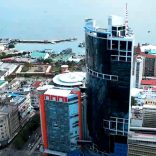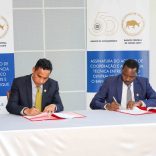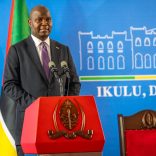Mozambique: Hindrances to construction of water systems in Cabo Delgado
Kroll full report 3: Kroll points fingers at Finance Ministry, Credit Suisse & Palomar – Hanlon

The full Kroll report on its forensic audit, still not publicly released, highlights the roles of two Mozambicans and two foreign companies. They are:
+ Antonio Carlos do Rosario, who has identified himself as “Person A”; he is a senior official of the security services (Servico de Informacoes e Seguranca do Estado, SISE) and CEO of the three companies, ProIndicus, MAM and Ematum.
+ “Person D”, who was identified by Savana as Maria Isaltina de Sales Lucas, now Economy and Finance vice minister, but in 2013 was national director of treasury.
+ Two foreign companies and one person are highlighted: Credit Suisse plus Palomar and “Person B”.
Kroll looks closely at the guarantees issue. It also notes that three Mozambican banks hold parts of the debt. Finally, the full Kroll report makes clear that huge amounts of information were never supplied so many things remain unknown. For its part, the IMF has stressed that there can be no progress on a new agreement without the release of more information.
The full Kroll report (scanned, 80 Mb!) is posted on
Kroll suggests Credit Suisse acted improperly – turning a blind eye and loan pushing
Kroll raises serious questions about the conduct of Credit Suisse and suggests some of the misconduct could be criminal, especially with respect to failure to carry out due diligence on the loans. Recommendation 3 in the report is that the attorney general’s office (Procuradoria-Geral da República, PGR) should “request, under the Mutual Legal Assistance arrangements in criminal matters, that the UK Authorities request the details of enhanced due diligence documentation from Credit Suisse.” (See this newsletter issue 381, attached.) In addition, it points to various issues around the loan arrangement, including loan pushing, keeping the money out of Mozambique, and a “cash back” to lenders to hide the real interest rate. Kroll also raises questions about the role of “Person B” in arranging loans and then moving from Credit Suisse to Palomar, which Kroll says was a joint venture between contractor Privinvest and Person B; Palomar and Person B deny misconduct.
All of the loan payments (after deduction of commissions) were made directly to Privinvest companies and never entered Mozambique. Kroll points out that “The contractor, in the Privinvest Presentation, stated that Credit Suisse insisted ‘no funds raised pursuant to the ProIndicus financing were paid into banks or accounts in Mozambique’.”
Kroll in effect accuses Credit Suisse of “loan pushing” – encouraging the borrower to take a bigger loan than it originally asked for. Between April and June 2013 the ProIndicus contract was changed four times and the loan increased from $366 mn to $616 mn. Kroll comments that “the total price and scope of the contract appears to have increased due to further financing being available from Credit Suisse. The Privinvest Presentation stated that ‘As a result of substantial lender appetite the deal size was subsequently increased three times’.”
Credit Suisse imposed a number of “preceding conditions” on the ProIndicus loan, including approval by the Administrative Tribunal (audit court) and informing the IMF about the guarantee. These were not done and Kroll could only find a note saying the conditions had been “overcome”. The ProIndicus guarantee states that the government would report to Credit Suisse on its finances including budget, debt strategy and documents provided to the IMF. Kroll finds no evidence this was done. The Ministry of Finance issued an “opinion document” on 26 February 2013, signed by do Rosario (“Person A”) and an unidentified “Person L”, which said that Credit Suisse’s conditions had been “overcome” due to “obvious reasons”. There was a clause in the draft government guarantee saying that the guarantee will be included in the government budget, but the opinion document said this clause should not be included. The opinion document contains a handwritten note dated 25 February 2013 signed by Person D (Isaltina Lucas) saying there was “alignment with SISE, which was represented by [Person A]” as the matter related to national security. Credit Suisse initially imposed conditions which would have made the loans impossible, because the debts were over the limit and would not be repayable, and the IMF would have seen this. The conditions were then “overcome”. How this happened was never explained to Kroll – but Credit Suisse closed its eyes to the illegitimacy of the debt
Of the $2 bn In loans, Kroll found that $292 mn was paid in fees. Fees for the original loans and subsequent restructurings earned the banks themselves $92 mn – Credit Suisse $51 mn and VTB $41 mn. Palomar received $35 mn and a consortium of BNI and Ernst&Young received $17 mn. But the biggest fees paid were a way for Credit Suisse and Mozambique to pretend that the interest rate was lower than it really was.
The VTB MAM loan was at LIBOR+7.0%. LIBOR is the London Interbank Offered Rate, about 0.7% in 2013. The Credit Suisse ProIndicus and Ematum loans were at LIBOR+3.2% and +3.7%, which looked good but was actually lower than the lenders were willing to accept. So Credit Suisse gave a 9% discount, in the form of a “contractor fee” – a “cash back” or kickback. So those who put up the money for the $1.47 bn bonds and syndicated loans were immediately given back $141 mn – in effect they were lending a smaller amount but being repaid as if they had lent a larger amount.
Indeed, Privinvest “Person G” sent a note to “Person A” (do Rosario) expressing concern about the interest rate being mentioned in the loan agreement. The letter said: “Thanks my brother. We need one [Ematum loan agreement] without the mention of the ‘Libor + 3.7%’ because the bank is taking much more and we are subsidizing the rest!! Can he/she remove the phrase please? ProIndicus letter didn’t mention interest rates.” The approval letter was not changed, however.
Guarantees given knowing they were improper
The Ministry of Finance gave various guarantee letters while knowing they were dubious, Kroll found. “Between February 2013 and December 2014 the Ministry of Finance authorised five separate guarantees totalling $2.2 bn for loans entered into or planned,” Kroll notes. “Since authorising the guarantees, the Mozambican companies have generated negligible revenues and have been unable to service their debt commitments.” The guarantees were pushed by SISE official do Rosario (“Person A”) and “Person E”, identified by Savana as the then director of SISE,Gregório Leão. “It appears that considerable emphasis was placed on the secrecy of the projects and that they were described as a matter of national security. The documents that formed the basis of the government guarantees were then subjected to minimal scrutiny rather than being submitted for parliamentary approval. In addition, the individuals approving the government guarantees were warned by those requesting the government guarantees to not involve anyone else in the approval process.”
The Ministry of Finance is supposed to conduct an assessment of any guarantee, but it appears this was not done. Indeed, the official approval for the Ematum guarantee “appears to be missing from the file and cannot be located” and the formal request for the ProIndicus guarantee cannot be found.
But it is clear that the participants knew the guarantees were improper. On 25 April 2014, “Person E” (then director of SISE, Gregório Leão) asked for a government guarantee for a loan to MAM. “Person C” (named by Savana as then finance minister Manuel Chang) replied to Leao that MAM should pursue other financing that would not have an impact on public debt. Do Rosario then met with “Person D” (Isaltina Lucas, now Economy and Finance vice minister, but in 2013 national director of treasury) and a representative of Palomar (see more below), owned by the contractor Privinvest. Lucas said she was told that the loan could not go ahead without a government guarantee, and that do Rosario told her and the Palomar representative that the financing value was above the ceiling for the government guarantees as set in the Mozambique budget law and the indebtedness limit agreed with the IMF. Nevertheless, the guarantee was agreed by Finance Minister Chang on 2 May 2014.
The Bank of Mozambique approved the first ProIndicus loan. Kroll notes that “the role of the Bank of Mozambique in approving foreign currency denominated loan agreements for state owned companies is restricted to ensuring the person authorising the loan has the appropriate legal authority.” Kroll says that for the ProIndicus loan, that was Person C, former finance minister Manuel Chang. This could complicate any legal case in which Mozambique refused to pay based on the argument that Chang had no right to sign the guarantee.
The Bank of Mozambique stressed that it did not assess the viability of the guaranteed projects or consider business plans, and assumed this was done by the Ministry of Finance, adding “we want to believe that there was a prior assessment of its risks and impact”.
The guarantees were not to the bank but to Palomar; Kroll finds this strange and said the Ministry of Finance could not provide a reason for requesting that the guarantee be made in favour of Palomar. Several of the guarantees did not specify the amount of money being guaranteed. Kroll also notes that both the parliamentary special commission and the audit court (Tribunal Administrativo) had found that the guarantees violated the law.
Questions about the role of a deputy minister
“Person D”, Maria Isaltina Lucas, was named Deputy Minister of Economy and Finance in March 2016, but in 2013 she was national director of treasury, and was identified by Kroll as the signatory of several of the guarantees. Kroll says it “identified potential concerns regarding [her] independence.” She was the person “responsible for signing the ProIndicus and MAM government guarantee opinion documents [and] was appointed to the Ematum Administration Board on 2 August 2013, approximately one month prior to the Ematum guarantee being issued. [She] was paid $95,000 for [her] role … during the period of August 2013 to July 2014 by Ematum. …It seems unusual for a government official to be receiving funds from a private company at the same time as approving government guarantees to that company and other closely linked companies. It is also of concern that the official approval documentation for the Ematum government guarantee appears to be missing from the file and cannot be located.”
The ProIndicus loan agreement with Credit Suisse said that all money should be given paid directly to Privinvest. It was signed on 15 January 2013 by “Person B” for Credit Suisse and was also signed by “Person D”, Isaltina Lucas. Kroll says “it is not clear why Person D signed this indicative terms document on behalf of the Ministry of Finance on 15 January 2013, more than one month before issuing an opinion to the Ministry of Finance approving a government guarantee for the loan. … Concerns are therefore raised that by signing the indicative terms and conditions in advance of approving the government guarantee, Person D was not in a position to independently consider the merits of the request for the government guarantee.”
Palomar: arranging loans, advising the finance ministry & working with Credit Suisse
Kroll devotes an entire chapter to “Palomar and Person B”. The Privinvest Group (http://www.privinvest.com) is named as the “contractor” and the group includes Privinvest Shipbuilding and Abu Dhabi Mar, as well as Palomar Capital Advisors and Palomar Consulting (http://www.plmr.com). Kroll notes that “Palomar is a joint venture between the contractor [Privinvest] and Person B”.
“Person B” was initially at Credit Suisse and “was involved in negotiating the initial loan agreements with ProIndicus” and continued to be involved with Credit Suisse on ProIndicus until June 2013, when it was reported he moved to Palomar and became a director later that year, Kroll reports. Palomar also “had a role in arranging the MAM loan”. Kroll points to the “expanding role” of Palomar in the Mozambique Project.
Palomar and Credit Suisse made a joint proposal to the government in July 2013 to create a Mozambican sovereign wealth fund using gas revenue. Kroll reports this was rejected by the Bank of Mozambique, but was raised again by Palomar with the Ministry of Finance in February 2016.
Palomar also had a $30.5 mn contract with the “Ministry of Finance for providing financial advice in relation to the ProIndicus loan agreement” and was to receive “running fees” for involvement in the restructuring of the ProIndicus loan. Palomar Capital Advisors was placed into liquidation in Switzerland on 18 October 2016 and on 17 October 2017 Palomar assigned the rights to the Proindicus running fees to VR Global Partners, apparently based in the Cayman Islands.
Person B attended meetings for Palomar with the Ministry of Finance and the three Mozambican companies and Mozambican banks.
Somewhat unusually, “an agreement signed between Palomar and ProIndicus in 2013 made Palomar solely responsible for generating revenues for ProIndicus” in exchange for a 10% share of the revenues.
Palomar was also appointed advisor to MAM and ProIndicus to help restructure their loans. At a meeting in May 2015 Palomar recommended to the Ministry of Finance an “innovative structure, which, for accounting purposes, is not treated as debt and hence would not contribute to national debt-to-GDP statistics.” On 8 April 2016 Palomar, the bank BNI Mozambique and Legacy Advisors were named as financial advisors to restructure the MAM, ProIndicus and Ematum loans, in a letter which Kroll says also specified that “no other persons should be appointed as financial advisor to the Ministry of Finance.” The companies were to be paid fees of 3% of the outstanding loans, about $60 mn. On 17 October 2016 the agreement was terminated by the Ministry of Finance. Palomar objected, but this was accepted by BNI (which had been chaired by Adriano Maleiane until he was named minister of economy and finance) and Legacy (which the Ministry claims it does not know who are the owners)..
On 3 May 2016 VTB Capital sent a letter to Palomar copied to MAM saying that VTB understood that Palomar had been appointed financial advisor for restructuring the loan and that all communications would go to Palomar. Nevertheless, on 3 July 2016 Person A (do Rosario, CEO of MAM) sent a letter to VTB asking it not to execute the loan guarantee.
Mozambican banks hold $145 mn of secret debt
Kroll estimates that four Mozambican banks have exposure to $145 mn in Ematum bonds and ProIndicus syndicated loans – about 7% of the total $2 bn debt. They are, for ProIndicus, BIM $37 mn, MozaBanco $33 mn, BCI $30 mn, and ABC $7 mn. Two banks had Ematum Eurobonds which have now been exchanged for government bonds as part of the nationalisation of the Ematum debt; they are BCI $25 mn and MozaBanco $13 mn. This means BIM was the most exposed, at $52 mn, but the smaller MozaBanco was second at $46 mn, which must have contributed to its crisis earlier this year.
By Joseph Hanlon












Leave a Reply
Be the First to Comment!
You must be logged in to post a comment.
You must be logged in to post a comment.